Step up efforts for Rohingya return
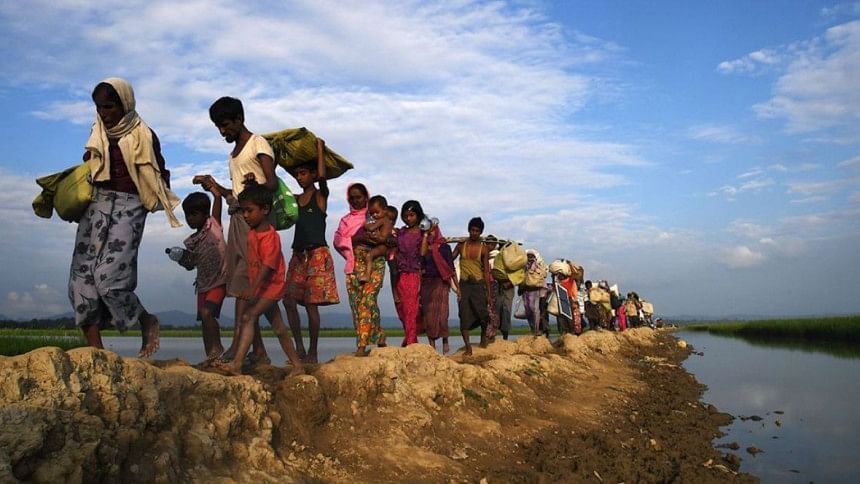
The UN Security Council yesterday urged the Government of Myanmar to step up its efforts to create conditions conducive to safe, voluntary and dignified return of the Rohingya refugees from Bangladesh.
In a statement, the council stressed that progress is also needed by Myanmar for implementing agreements on relations with the United Nations High Commissioner for Refugee (UNHCR) and United Nations Development Programme (UNDP) and with Bangladesh on return of the Rohingyas.
“The Members of the Security Council continued to stress the importance of undertaking independent and transparent investigations into allegations of human rights abuses and violations,” read a statement issued after the closed-door meeting held at United Nations Headquarters in New York yesterday afternoon.
Diplomatic sources in New York said like the previous four meetings, several Security Council members called for imposing sanctions to put pressure on Myanmar, but China, a close ally of the country and a veto-wielding council member, is highly unlikely to agree.
The new UN Special envoy for Myanmar, Christine Schraner Burgener, who visited Myanmar in June and briefed the UNSC yesterday, said Myanmar's leaders want to bring the refugees back, but there are divisions not only between the government and Rohingyas but also between the Muslim minority and the rest of Rakhine's mostly Buddhist population, reports AP.
Burgener said she travelled widely, met government officials including State Counsellor Aung San Suu Kyi three times and got approval to open a small office in Myanmar's capital, Naypyitaw. She said she plans to return to Myanmar in September.
“I need dialogue, and for that I need open doors,” to discuss “critical questions” and advise the government on “how they can also change the attitude of the communities on the ground.”
Burgener told reporters, “I think Myanmar is not a country which is reacting quite on pressure, but it's up to the Security Council.”
Sweden's UN ambassador, Olof Skoog, the current council president, stressed the importance of unity, though he said his country thinks progress has been “far too slow”, according to the AP report.
“I think there is a recognition among Security Council members that there have been positive steps taken lately. It's also fair to say that many of those steps are far from sufficient,” Skoog said. “As long as the council is unified in terms of engagement, but also on putting pressure, I think we are making progress slowly.”
This was the fifth UNSC meeting since the previous meetings held on September 28, November 6 and December 12 in 2017, and February 13, 2018. But, the Security Council could not take any action against Myanmar as China, backed by Russia, blocked even any UNSC statement.
“Some members of the council have kept us from taking action for cynical and self-interested reasons,” US Ambassador in United Nations Nikki Haley said in Security Council meeting in May. “Some undermined the unity of the council demonstrated during the trip with unhelpful edits that only weakened the council's message.”
China also proposed substantial amendments to a British-drafted Security Council statement on Myanmar on May 9 and the 15-member council eventually agreed a weaker statement, which also urged Myanmar to step up its efforts to create conditions conducive to safe, voluntary and dignified return of the Rohingyas. It also urged Myanmar to address the root causes of the crisis through implementation of the Rakhine Advisory Commission recommendations, including those related to human rights, citizenship, poverty alleviation and development.
Apart from the 15 Security Council members' visit, UN Secretary General, World Bank President and UN agencies chief visited the refugees in Cox's Bazar on July 1-2 and their call was identical to them and previous meetings, but there are serious doubts about the conducive conditions in Rakhine for safe, voluntary and sustainable repatriation of the Rohingyas from Bangladesh.
“The conditions are simply not there for a large number of people to return home,” Red Cross President Peter Maurer, who recently visited Myanmar, told a press conference in Dhaka on July 3.
Dire conditions led more than 300,000 to 500,000 to flee the country between 2012 and 2016 and the latest crisis in Rakhine began on August 25, 2017 that forcibly displaced over 700,000 Rohingyas, who fled Myanmar and took shelter in Bangladesh.
The military crackdown was accused of widespread human rights violations, including rape, murder, torture and burning of Rohingya villages and thousands are believed to have been killed which the UN, US and international rights bodies said “text book example of ethnic cleansing”.

 For all latest news, follow The Daily Star's Google News channel.
For all latest news, follow The Daily Star's Google News channel. 

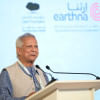
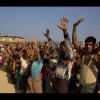
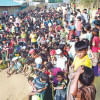
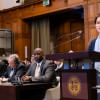


Comments